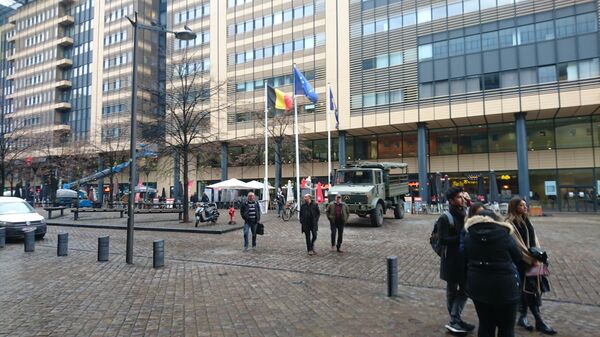According to police, about 5,500 people gathered on Sunday in Brussels to protest against the UN pact on migration.
#Update: Another Video of Protestors giving an speech at the European district "#Shumanplein" in #Brussels! To protest against the #UN Migration Pact of #Marrakech in #Belgium! pic.twitter.com/qkJEiZp8RG
— Sotiri Dimpinoudis (@sotiridi) December 16, 2018
Later in the day, the police reported that no serious incidents had occurred during the rally. The protesters gathered in the European Quarter, where various EU institutions are located, shouting "We are tired, close the borders," "No jihad in our country" and other slogans, in particular, calling for the prime minister's resignation.
The march was organized by 10 right-wing movements and parties from Belgium's Flanders region and other opponents of the UN global compact on migration. Some 12,000 people confirmed their participation in the rally via Facebook, while 35,000 people showed their interest in attending the event.
According to media reports, a number of individuals were engaged in talks with "yellow vest" protesters in the southern region of Wallonia, hoping to make them join the march.
Earlier in December, representatives from 164 countries adopted the Global Compact for Migration, which was approved on July 13 by all UN member states except the United States, which withdrew from the pact last year.
Beaucoup de monde à la marche contre le #PacteDeMarrakech à Bruxelles #Immigration pic.twitter.com/6GshEpCNI2
— Pancrasse ن (@Pancratus) December 16, 2018
The paper represents the international community's attempt to establish a common global approach to all aspects of international migration. The paper comprises 23 objectives for better managing migration at local, national, regional and global levels.
Des milliers de manifestants à Schuman.
— pierrebxl (@pierrebxl) December 16, 2018
Le rond-point est trop petit! #MarsTegenMarrakesh #MarcheContreMarrakech #Bruxelles #Brussel pic.twitter.com/6LVQE7GC3d
The measure has proved particularly divisive issue in Europe, with Bulgaria, Slovakia, Belgium, Austria, the Czech Republic, Hungary and Poland raising concerns over possible limits on their ability to shape own immigration policies.
Follow Sputnik's live feed to find out more.


